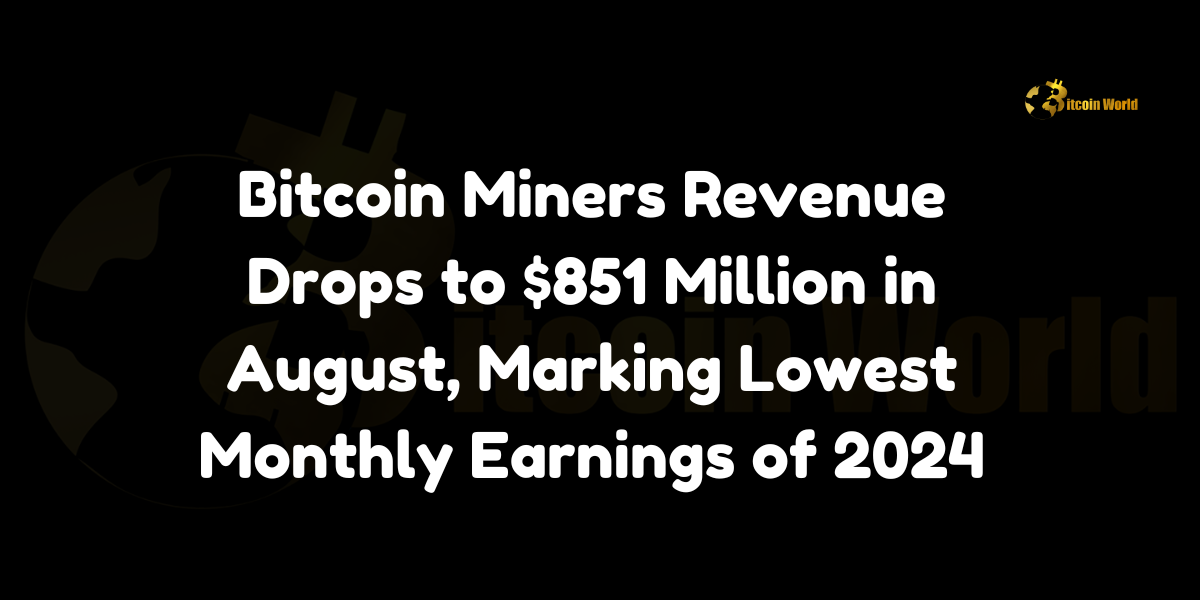Bitcoin miners revenue August 2024 saw a significant decline, reaching the lowest point of the year as total earnings dropped to $851.36 million. This figure, reported by Bitcoin.com using data from The Block, represents a $99.75 million decrease compared to July, highlighting the challenging environment miners faced during the month. The revenue included $20.76 million from on-chain transaction fees, a small but crucial component of miners’ overall earnings.
The Decline in Bitcoin Mining Revenue
August 2024 was notably difficult for Bitcoin miners, who saw their monthly revenue dip to its lowest level of the year. The $851.36 million earned by miners combines income from both block subsidies—rewards for successfully mining new blocks—and transaction fees collected from users. The drop from July’s revenue signals ongoing challenges in the mining sector, which is highly sensitive to Bitcoin’s market performance and network activity.
Several factors likely contributed to this downturn in revenue:
- Reduced Transaction Volumes: A decrease in Bitcoin network activity can lead to lower transaction fees, which directly impacts miners’ earnings. In August, on-chain transaction fees contributed $20.76 million to the total revenue, underscoring the importance of network activity in sustaining miner profitability.
- Market Volatility: Bitcoin’s price fluctuations significantly affect miner revenue. A lower Bitcoin price can reduce the fiat value of rewards, even if the number of coins mined remains constant. August may have seen such price-related challenges, contributing to the overall revenue drop.
- Increased Mining Difficulty: As more miners compete to solve Bitcoin’s cryptographic puzzles, the network’s difficulty adjusts upwards, making it harder and more resource-intensive to mine new blocks. This increase in difficulty without a corresponding rise in Bitcoin’s price can squeeze miners’ profit margins.
Comparison with Previous Months
The $851.36 million earned in August represents a steep decline from July’s revenue, which was $99.75 million higher. This month-over-month drop suggests that miners are grappling with increasingly tough conditions, potentially due to a combination of lower Bitcoin prices, higher operational costs, and increased competition.
Moreover, the decrease in revenue could reflect broader trends in the cryptocurrency market, where periods of low volatility and reduced trading activity often lead to fewer transactions and, consequently, lower transaction fees for miners.
The Role of Transaction Fees
Transaction fees, while a smaller portion of miners’ overall income compared to block subsidies, are becoming increasingly important as the Bitcoin network matures. In August, miners earned $20.76 million from these fees, which are paid by users to prioritize their transactions. This component of revenue is closely tied to network demand—when there is high demand for transaction processing, fees tend to rise, boosting miners’ income.
However, during periods of low demand, transaction fees can decline sharply, as seen in August. This volatility in fee revenue highlights the challenges miners face in maintaining profitability, particularly as block subsidies continue to decrease with each Bitcoin halving event.
Implications for the Mining Industry
The sharp decline in Bitcoin miners revenue August 2024 could have several implications for the mining industry:
- Operational Pressures: Lower revenue may force some miners to reassess their operations, particularly those with higher operating costs. This could lead to consolidation within the industry, with smaller or less efficient operations being squeezed out by larger, more resilient players.
- Increased Focus on Efficiency: As revenue pressures mount, miners may increasingly focus on improving operational efficiency, whether through adopting more advanced mining hardware, optimizing energy use, or exploring new locations with cheaper electricity.
- Market Sentiment: The decline in mining revenue could reflect broader market sentiment, where reduced network activity and lower Bitcoin prices suggest a temporary cooling off in the cryptocurrency market. However, this could also be a period of consolidation before a future uptick in activity.
Conclusion
The significant drop in Bitcoin miners revenue August 2024 to $851.36 million, the lowest of the year, underscores the challenges facing the mining industry. With $20.76 million earned from transaction fees, the data reveals the intricate balance miners must strike between operational costs, network activity, and market conditions.
As the industry adapts to these pressures, the focus on efficiency and cost management will likely intensify, shaping the future landscape of Bitcoin mining. While August’s figures highlight a difficult period for miners, the ever-changing nature of the cryptocurrency market means that conditions could shift rapidly, offering new opportunities and challenges in the months ahead.
To learn more about the innovative startups shaping the future of the crypto industry, explore our article on latest news, where we delve into the most promising ventures and their potential to disrupt traditional industries.





